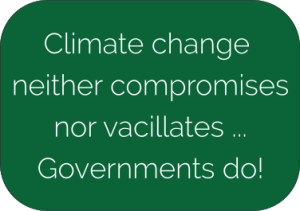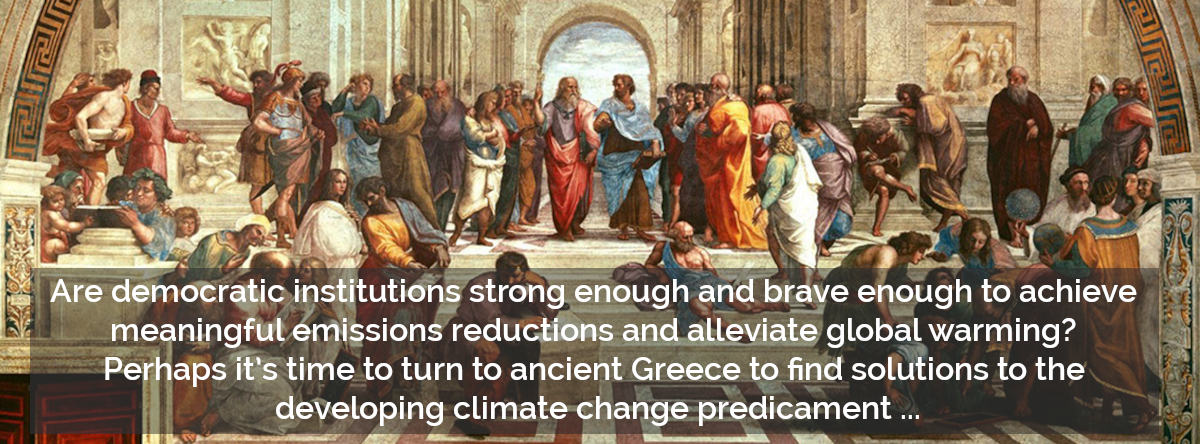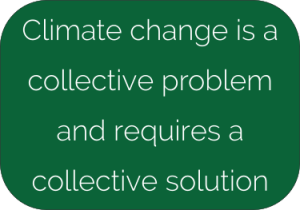CLIMATE CHANGE – DEMOCRACY’S DILEMMA
Author: Robert Watson
rocky@rockflat.com.au
Keywords: Climate Change,global warming,democracy dilemma,collective solution,
3rd July 2024
Most democracies, and some non-democracies, Acknowledge anthropocentric induced climate change. This is not a surprise as humankind has embraced anthropocentrism since the evolution of homo-sapiens, and has used, then exploited the natural world’s flora, fauna and natural resources in a quest to create a better quality of life. Since the start of the industrial revolution in the second half of the 18th century, many of the world’s natural resources have been completely or severely depleted; millions of square miles of forest have disappeared, fauna extinction rates are increasing exponentially; biodiversity is declining; ecosystems are being destroyed or degraded(1); and the primary threat to humankind today is global warming caused by climate change. In 2005 Australian environmental philosopher Glenn Albrecht coined the word solastalgia(9) – a term to describe the solace, desolation and pain derived from the immediate loss of or assault to one’s place of residence, with specific reference to climate change and mining. Despite widespread agreement on the existence of climate change, there is substantial “push-back” against taking meaningful action that may be detrimental to the short-term interests of government, sectors of the mining industry, the financial and corporate sector, as well as some of the demos (the people).
The science is clear. Most people and, one would hope, all politicians know what measures need to be taken to reach the 2030 emissions reduction targets and net zero by 2050. Politicians are also aware that the measures will in some cases be uncomfortable, unpopular and very expensive. If there is a weakness in democracy, it is that elected institutions will seldom initiate measures that will effect them badly electorally, especially if those measures are for something that many of the demos haven’t yet experienced, and often don’t completely understand, and if those measures are for long-term benefit from which the representatives of the body politic will gain little, if any, immediate kudos.
While democracies function on compromise, climate change is uncompromising. Governments enlist scientists and economists to assess climate change and make recommendations to minimise climate change damage but mostly fail to instigate the tough and expensive measures required to get climate change relief. The reasons for tardiness and failure are varied, but invariably relate to a reluctance to adequately fund relief measures such as, renewable energy research and development and development of infrastructure for renewable energy, as well as reluctance to curb the activities of the fossil fuel industry because of the tax and royalty revenue that many governments rely on. Governments also fear community backlash if renewable energy was unable to keep up with energy demand.
One of the difficulties in finding common ground to have significant effect on the changing climate is that some of the critical strategies for mitigating the effects of climate change have been introduced on international rather than national agendas. For example, the COP organisation monitoring the effects of climate change worldwide, holds regular very large conferences which attract publicity and both praise and criticism from different quarters, however in reality COP has been relatively ineffective. As with other international organisations the inherent weakness is the lack of international jurisdiction and influence over all member countries.
Different national agendas for dealing with climate change vary markedly, and even within nations there are often quite divergent methods and technologies suggested as solutions. Countries with existing nuclear power facilities are able to reduce carbon emissions by increasing nuclear power use, however nuclear is neither renewable nor clean and after many decades, there is no satisfactory and safe method of disposing of current nuclear waste much less any waste from increased power production. Countries without existing nuclear power facilities would find development from scratch to be prohibitively expensive and of little benefit with uncompromising climate change not waiting for the years it would take until new facilities were developed and operational.
Another technologies currently being promoted by some countries is carbon capture and storage, which involves the capture, transport and storage of carbon in a liquified form from facilities such as power station and gas fields, with storage theoretically in stable, subsurface rock formations. After more than 30 years and billions of dollars in development costs and taxpayer subsidies being spent, there is still not one viable and successful carbon capture and storage facility operating anywhere in the world. Carbon capture and storage is unproven and dangerous and should be seen for what it is, a distraction by fossil fuel industry to prolong the use of coal and gas.
Climate change is not yet a crisis, but it is an urgent matter that must be dealt with as soon as possible. The most successful non-polluting methods of achieving climate change relief would at this stage be wind, sun and tidal power, with the possibility of hydrogen as a power source as long as the energy-intensive methods currently required to extract hydrogen can be reduced.
A DILEMMA FOR DEMOCRACIES
The ten countries most threatened by and vulnerable to climate change are Chad, Somalia, Syria, Democratic Republic of Congo, Afghanistan, South Sudan, Central African Republic,
Nigeria, Ethiopia and Bangladesh (1), all of which had little or nothing to do with causing climate change, and none of which have the finance or technology to reverse the desertification, crop failures and water shortages caused by global warming. The wealthier developed nations – those most responsible for atmospheric emissions and climate change – are prepared to wait and see who will act first because, due to the vagaries of democratic systems, the difficult, expensive and unpopular decisions and policies that are required are not part of the formula for retaining or regaining political power.
There is overwhelming evidence that climate change is an existential threat including, increasingly repetitive temperature records broken, a rise in storm frequency and intensity, more erratic precipitation patterns and a ‘mountain’ of scientific data. Although climate change has become a defining issue in the world, some of the critical effects of climate change – shortages of food, water and power – have not yet been felt by developed nations. Why should governments of these mostly democratic wealthy countries act on existential, yet largely unnoticed threats? Climate change contradicts the attributes in which democracies excel. Democracies are good at dealing with the immediate, the urgent situations that arise such as natural catastrophes, pandemics and even terrorist threats, the situations of the here and now, the situations needing speedy resolution that usually result in kudos for the problem solver.
Although explicit and without ambiguity the words government by the will of the people, with the will of the people being the view of the majority of the people are misrepresented and distorted in parliaments, in senates, in Congress, by the media, and on the street the world over. For example in the 2000 Presidential election in US, Gore won the election on vote count yet Bush was able to claim the election due to the peculiar vagaries of United States democracy. Putin murders, falsely discredits and incarcerates political opponents to retain power in “democratic” Russia. Australian referendums are weighted by a double majority rule requiring a positive -positive outcome with a majority of votes in a majority of states, so nationwide a majority of votes and the will of the people will not necessarily win the referendum.
The complexity of climate change is a reason why there is such a wide range of opinions on aspects of climate change. Exaggeration, bias, misrepresented views and above all, ignorance, have become part of the worldwide debate on climate change cause, effects and remedy. Views are strongly partisan on one side or the other ranging from disbelieving climate change through to the believers, who are often in conflict over what should be done, how much to spend and when to act amongst some of the areas of discord. This situation makes for easy pickings for politicians knowing that both sides of the argument will have a significant support base. However, beyond politics and media, climate change requires an understanding of climatology, hydrology, pedology and ecology to name some branches of science that are applicable and there are few people with knowledge of all that is required to construct an inclusive view of causes, effects and cure.
A COLLECTIVE PROBLEM NEEDS A COLLECTIVE SOLUTION
There are several methods by which individual democracies could decide and agree on a course of action to alleviate the effects of climate change. A direct democracy is a system under which the people, or demos, have direct authority in deciding legislation. Although some countries have experimented with direct democracy, Switzerland is the only country with what can be called semi-direct democracy, where citizens can have a direct say through the three levels of Swiss government. For most countries, representative democracy is more practical than attempting to give consideration to the views of each individual on every legislative issue. Referendums and plebiscites are also useful for important issues and to decide on constitutional changes in representative democracies.
In representative democracies, elections are not necessarily an indication of support or rejection for an individual policy or issue because each party or candidate contesting an election has a bag of policies and issues on which you have to decide. You may not like all the policies that a candidate stands for, but the one particular issue more important to you, say, no road tax on electric vehicles, is supported by the candidate, so the candidate gets the vote. Moreover, short election cycles and strongly partisan political views that are prevalent in most democracies are not conducive to halting global warming. Although representative democracy and the holding of elections are more efficient method of running government by the people in a crowded world, it are not transparent form of government and certainly prove to be less than adequate in dealing with non-critical yet urgent and important large issues such as climate change.
The world today has a preponderance of individuals peddling their selfish ideals, desires and successes. Two major wars in Ukraine and Gaza have drawn resources, money, and attention to satisfy the different whims of two individuals, Putin and Netanyahu. The recently defeated Conservative UK Prime Minister, desperate for relief from the Conservatives almost comical, mistake-ridden election campaign, was set to reverse positive climate change policies instigated by his own government based on his reading of the mood of the electorate. Germany and France, two of the best climate-friendly countries, are preoccupied with Putin’s folly. In Australia the “climate war” is becoming more intense, with no sign of mutual cooperation between the two major political parties that don’t actually stand too far apart. Piecemeal climate change measures and adherence to unproven and often energy-intensive technologies with little international cooperation are hallmarks of world climate change programs and this needs to change. Climate change is a collective problem and requires collective solutions.
Collectivism is the idea that people should prioritise the good of society over the welfare of the individual. Collectivism has to do with political theories that put the group before the individual and advocate collective control over a situation, a production, or in this case, the concern and handling of global warming. Collectivism has, somewhat erroneously, been a catch-cry associated with communism, so in order to avoid bias or uncertainty, the preference is to consider the use of citizen assemblies, plebiscites, and/or referendums to help provide collective and successful solutions to climate change. A system not unlike the Athenian city government of the 6th century BC, considered by most scholars to be the birth of democracy as we now know it,.
Any collective action can work in two opposing directions: those more climate-friendly, espousing policies and actions to stop climate change, and those not yet convinced of the climate change threat, opposing the financing of and measures that may be detrimental to their financial well-being and lifestyle. Nations that are already pro-active in dealing with climate change are at a distinct financial disadvantage, as the agnostics and vacillators bide their time. However, the early movers do have the benefit of providing cheaper and cleaner renewable energy to their citizens and being ahead of the game with technology.
Citizen assemblies are a democratic system of decision-making that can be instigated at local, regional, state or national level. Citizen assemblies are a group of independent and broadly representative people brought together, either by local ballot, recommendation from other community members, or volunteering, to consider specific issues that are relevant to their community. They can enhance their understanding of issues by inviting experts, specialistsand academics to inform their thinking. A citizens assembly reaches a conclusion on the issue or issues being considered and makes recommendations as to what they think should happen. Citizen assemblies are a collective system almost as pure and transparent as democracy can be.
Australia is one of the least collective nations in the world, favouring individualism (8). Could one imagine citizen assemblies considering climate change issues away from political party, fossil fuel mining, commercial interests, and other vested interests? Possibly, because Australia is also one of the least restrained or most indulgent nations (8) and just may try something that could be beneficial. Since the election of a pro-climate action Labor government in 2022, most climate-concerned citizens have realised that the actions of Labor in tackling global warming have fallen well short of the narrative and are really little better than the opposition conservative coalition parties, which have members overtly opposed to renewable energy measures and surrendering to the will of the fossil fuel industry. Citizen assemblies could advise politicians on policies the demos would most like to see pursued.
Referenda and plebiscites are additional tools that governments can use to assist in developing effective climate change policies. Most Australian governments are reluctant to call for referendums due to the extremely high rejection rate of referendum proposals. Since federation, only 8 of 45 referendum have been approved (3). Most of the reasons for high rejection of referendum proposals could be overcome without legislative or constitutional change by using citizen assemblies. A firm proposal for a referendum or non-constitution-binding plebiscite proposal coming from the people to the government of the day would avoid government prejudice in the wording of a ballot proposal, would surely ensure bipartisan support from the major political parties, and should ensure a well-informed voting public prior to the ballot.
International politics is not democratic enough to deal with climate change. There is no global government to instigate and oversee cooperation and action against climate change. A permanent international climate change committee composed of qualified individuals chosen for set terms by each of the national citizens assemblies would be necessary to address climate change on a global scale with collective involvement. The committee would operate similarly to citizens assemblies, drawing on their own knowledge and experience as well as consulting with experts in fields such as science, ecology and agronomy. In areas pertaining to the environment and climate change, the committee’s authority and jurisdiction would supersede those of national authorities. The committee’s authority would also include the power to impose penalties and/or sanctions on countries that violate collective agreements.
The foregoing Utopian concept is counter to the current world of conflicts, confusing and irrational political scenarios, middle-class apathy and lack of concern for the environment. However, it won’t be long before the more astute people in our communities seek a global solution to climate change problems.



